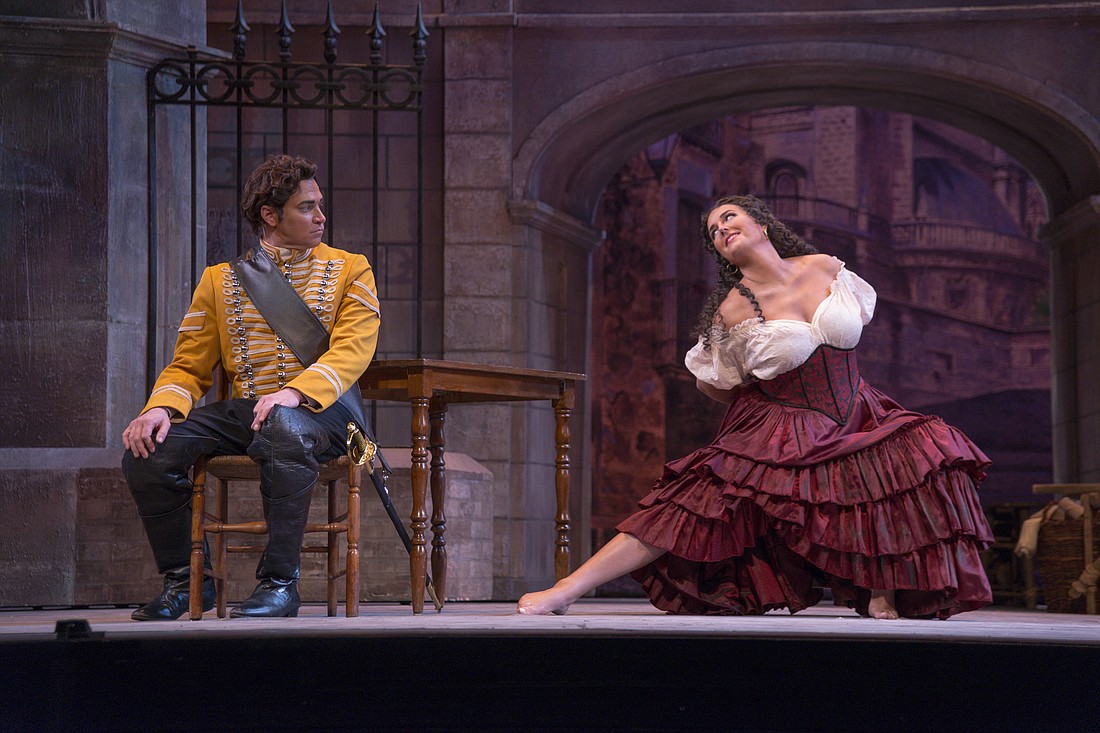- February 9, 2026
-
-
Loading

Loading

Considered a failure at its premiere in 1875, Bizet’s opera “Carmen” has now entered the pantheon of the world’s most loved operas, and it was given a rousing revival last Saturday by the Sarasota Opera. “Carmen’s” return after an absence of six years was greeted with enthusiastic applause and cheers by the sold-out audience.
Producing “Carmen” is not for the faint of heart, since it requires not only fine singers, but equally talented directors and designers to relate this vivid tale of gypsy love, fatal attraction, jealousy and death.
For this production, Sarasota Opera has assembled an outstanding cast, beautifully led by Lisa Chavez as Carmen. Chavez, who was most impressive in last season’s “Dialogues of the Carmelites,” has a rich, full mezzo voice, with a warm “honeyed chocolate” sound that is even throughout its range. The “Habanera” and “Seguidilla,” showed Chavez’s Carmen at her seductive best, and her “Card Aria” in Act 3 revealed a great depth of dramatic intensity.
Chavez was equally paired with the virile tenor of Cody Austin in his first Sarasota appearance. His is a large and well-focused voice with a nice “ping” on top, and he uses it to good advantage, especially in the emotional passages. However, it’s a bit puzzling that he chose to sing the climax of his Act 2 “Flower Song” in ringing full voice, as opposed to the soft vocal caress Bizet indicated. Austin’s acting was appropriately wooden for small towner Don José, who is alternately teased, seduced and then discarded by our fatalistic gypsy.
Hanna Brammer, another apprentice and studio artist advanced to principal status, was a strong Micaela. Too often Micaela is portrayed as a wimpish country girl, but Brammer had none of that. Her Micaela, though shy at first, was clearly a girl with a mission in all her appearances, and her Act 3 aria was beautifully sung. She has a lovely voice, especially in the middle range, with an upper register that can tend toward shrillness at times.
The role of Escamillo, the toreador, is a bit of a vocal dilemma. His one aria, the famous “Toreador Song” has an extended vocal range that can either seem too high or too low, depending on the singer, while the rest of the role is within normal boundaries. Baritone Steven LaBrie certainly has the swagger and look of the handsome and popular hero who steals Carmen’s affections from her army corporal. His well-sung “Toreador Song” was definitely a crowd pleaser.
The small role of Morales in Act 1 has always held a particular significance for me. His is the first solo voice heard in the opera, and it invariably sets the standard for vocal performance of the evening. Baritone and Studio Artist Jared A. Guest did this admirably, as it was indeed an evening of fine singing.
All the smaller but pivotal roles were well sung and acted: Costas Tsouriakis as Zuniga was appropriately lecherous, making a better impression than his earlier appearance in “Manon Lescaut,” and Chelsea Davidson and Nicole Woodward, as Frasquita and Mercedes were properly coquettish throughout, including their well-sung “Card Trio” in Act 3.
Alexander Charles Boyd, as head of the smugglers, gave Le Dancaïre the proper mix of menace and mirth, and Sean Christensen once again proved his value as a comprimario as Le Remendado, Boyd’s wine-swigging partner in crime.
“Carmen” is an immense chorus opera with big scenes in every act, and Roger L. Bingaman’s chorus of apprentices never disappointed. Especially impressive was the chorus of women factory workers in the fight scene in Act 1. The children’s chorus in the changing of the guard, which can be treacherous at times, was outstanding and showed careful preparation by Youth Chorus Master Jesse Martins.
The stage direction of “Carmen” with all its crowd scenes and happenings could easily be a director’s nightmare, but Martha Collins and her innate instinct for handling large groups of people on stage never disappointed. Each chorister or supernumerary appeared to have a specific personality and duty, whether as a seller of oranges or fans, a sleeping villager, or vigilant guard, giving everyone a vital role as a member of the stage drama. Intimate scenes were equally effective, especially the highly emotional moments between Carmen and Don José.
Evocative sets from the 2012 production were designed by David P. Gordon and beautifully lit by Ken Yunker. Again, costumes and wigs were coordinated by Howard Tsvi Kaplan and Brittany Rappise.
The performance was conducted by John F. Spencer IV, marking his debut with a main stage production. Spencer, a member of the music staff and assistant conductor since 2012, led a good but workmanlike performance, which I found a bit lacking in both the intensity and passion so evident in Bizet’s score. “Carmen” is not an easy baptism for any conductor, and I’m sure he will improve as his confidence increases.
Still, this is a “Carmen” not to be missed, and as the remaining performances promise to be sold out, I’d suggest you order your tickets soon.